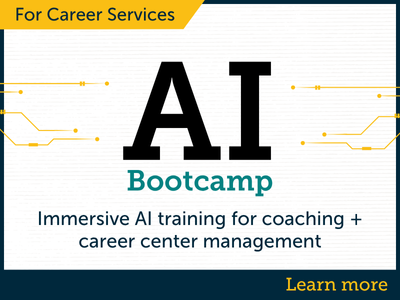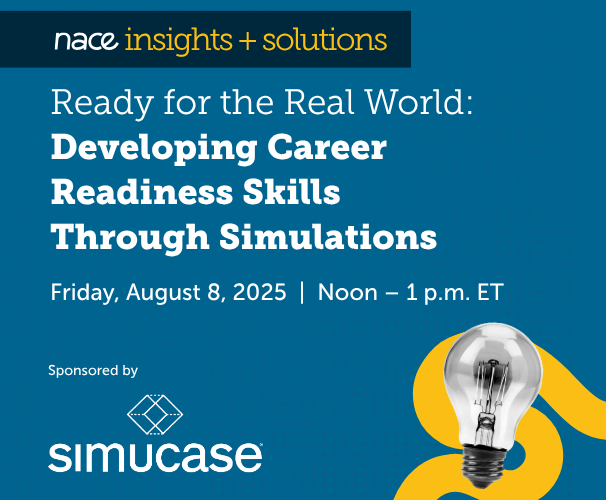By the Principles for Ethical Professional Practice Committee
SUMMARY
The following case study discusses ethical considerations when an employer seeks to connect with specific student populations through the career center in order to enhance diversity recruitment efforts. Principles 1, 3, 4, and 5 of the Principles for Ethical Professional
Practice are used to address this scenario.
This case study provides insight on the following:
- Using employer events designed for specific populations as an augmentation to overall recruitment efforts by the employer.
- The career center’s role in protecting student information.
- Appropriate outreach that supports the employer’s goals as well as access to opportunities for students.
- The role partnerships with student organizations and campus diversity support units can play in employer relationships and recruiting activities.
THE CASE
Scenario: An employer contacts the career center about assistance with its specific recruitment efforts. The recruiter requests a list of junior and senior students who are BIPOC (Black, Indigenous, and people of color), and students with disabilities to invite to a special dinner where the company will present information about the firm and its available jobs. The company has been a major financial contributor to the school’s retention programs.
While there is no explicit expectation voiced by the recruiter, the career center staff understand that the company’s high visibility on campus, as well as the importance of its donation to support programs, creates subtle pressure for the career center to comply with the request. In addition, the company has a steady track record of hiring graduates from the institution, and alumni are well represented within its ranks. The staff further realize that, although this particular request focuses on an employer wanting to connect with BIPOC students and students with disabilities, the request raises questions that are relevant to a variety of connections employers might seek with students from many diverse social identities. The request is therefore an example of a specific question that the career center may need to consider in the larger context of its efforts.
Questions:
- Is holding an informational dinner for BIPOC students and students with disabilities appropriate?
- Is it permissible to comply with the employer’s request for the names of students?
- Should the career center promote this event only to the students requested by the employer?
- What if other students want to attend? Is there an equity issue in providing such a list to “partner employers” only?
- In a broader sense, how should career centers handle requests from employers seeking connections with students from diverse social identities?
- What is the career center’s role or connection to departments that have received financial contributions from this employer, and what, if any, responsibilities or expectations does this create? How does this impact the the career center’s level of service? How are sponsorship programs communicated around campus internally?
Analysis: Creating events for specific student populations in an effort to develop an inclusive candidate pool may be an employer goal but could result in unanticipated legal consequences for both the employer and the school. Events limited to only students of certain races, national origins, or other protected classifications could create discrimination liability under applicable law. Prior to planning such an event, the employer and career center should also consult with legal counsel regarding the potential legal risks.
In this regard, the career center staff understand the potential value of such programs but have concerns about the implications for students who are not included.
The career center staff should encourage the employer to open the event to all students without regard to race, color, or national origin. If the employer refuses to do so, the career center should try to educate the employer regarding the legal risks that such an event may create. While a mitigating risk factor here could be that other channels or strategies for students exist to access the employer outside of the planned event, the risks of the event must be evaluated by all parties involved.
Additionally, the career center staff are concerned about the precedent set by providing this kind of special assistance. Any steps taken must be actions the career center would take for any requesting employer, regardless of donor status.
Principles That Apply:
- Principle 1: Practice reasonable, responsible, and transparent behavior by clearly articulating and widely disseminating the organization’s policies and guidelines.
- Principle 3: Ensure equitable access without stipulation or exception relative to contributions of financial support, gifts, affiliation, or in-kind services, and by proactively addressing inclusivity and principles of nondiscrimination.
- Principle 4: Comply with laws in a timely and appropriate way if complaints of non- compliance occur.
- Principle 5: Protect confidentiality of all personal information related to candidates and their interviews, and their engagement with services, programs, and resources, as well as student information related to professional plans.
Options for Resolution:
The nuances in this case hinge on whether the special dinner the employer wishes to host constitutes an augmentation to its overall recruitment efforts at the institution or a restrictive channel that limits opportunities to only students with certain demographic attributes. As an augmentation effort, determination of which students get invited cannot be based on demographic attributes.
Is it permissible to comply with the employer's request for the names of the students?
No. This is not only addressed in Principle 5, but also by law, specifically the Family Educational Rights and Privacy Act (FERPA). Students’ names may not be released to the employer unless students provide written consent for the disclosure of such information. Even if the career center staff do not release the names, but instead offer to send the invitations on behalf of the employer to students from designated groups, this is problematic because selecting individuals for the list requires excluding certain students based on race, ethnicity, gender, sexual orientation, or other protected characteristics. Additionally, if the career center staff were to do so, the career center would be disclosing the names of students with disabilities or identifying those students to the employer, which could violate EEO and other nondiscrimination laws. Employers are generally not permitted to question applicants during the hiring process as to whether they have a disability. As such, specifically identifying students with disabilities could give rise to a claim of unlawful discrimination against both the employer and the school.
It is also worth noting that not all students disclose demographic characteristics, and the career center may not have accurate and complete data on student demographics. Additionally, should the career center staff engage in the selection of appropriate individuals, it is exposing itself (and the educational institution) to potential liability for violation of state and federal EEO laws, statutes, and regulations, as it has now actively participated in the potential discriminatory acts.
Instead, the career center staff may recommend student organizations the employer should consider contacting. This may appear to have little difference to the employer’s request, but it is different because a) students self-select into organizations and b) student organizations are not exclusive. The career center staff should further make it clear, in writing, that it will not be involved actively in selecting students who are appropriate for the event.
What if other students want to attend the dinner?
While the employer may reasonably market toward students affiliated with specific organizations or programs, the career center staff should advise the employer to also allow other students to attend. Just as focused career fairs do not exclude students, neither should employer initiatives. To that end, the career center staff may recommend combining outreach to student organizations with posting the event for all students in the career center’s database and using other targeting efforts. This may help to ensure that students are not excluded, or inadvertently missed if they don’t belong to one of the student organizations contacted.
Is it acceptable to provide similar assistance to other employers even though they are not donors to support programs on campus?
Absolutely; in fact, it is recommended that career center staff present a high-level overview of services offered, depending on the employer’s recruiting needs, and provide necessary introductions to other departments on campus. Principle 3 makes it clear that equitable access to students should not be influenced by donations or other forms of financial support. While this does not oblige the career center to underwrite the expenses of employer outreach initiatives, it does mean that the assistance provided to employers will be equitable.
Other Considerations
Note that, in this case, the employer has a track record of recruiting many graduates of the institution over a period of time. This suggests that the employer’s interest in the institution as a core recruiting school is broad-based and that the initiative is an augmentation to its existing efforts. It makes sense to review the scope of the employer’s involvement over time to better understand the context of the request. Perhaps the company has been successful recruiting at the institution except for students from certain backgrounds. The company may need a consultation on how it can better appeal to all students and improve the composition of its candidate pool. In doing so, however, the career center must ensure that all students of the school have equal access to the company and not encourage the company to target only certain students based upon race, national origin, or other protected classifications.
The career center should actively partner with student support units on its campus and perhaps develop an action plan around these types of requests. This practice not only facilitates a more seamless response when similar requests from employers occur, but also raises the career center’s visibility with students in need of assistance. The mission of student support units is to connect students with campus resources that can help them succeed and achieve their goals.
By building a bridge to these units, the career center serves as an ally and advocate to all students and strengthens its own networks.
Related Resources:
FERPA Primer: The Basics and Beyond
Reviewed and revised by the 2024-25 Principles for Ethical Professional Practice Committee.







